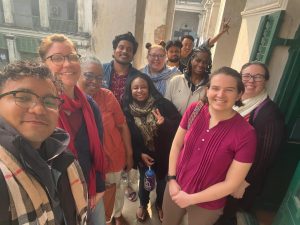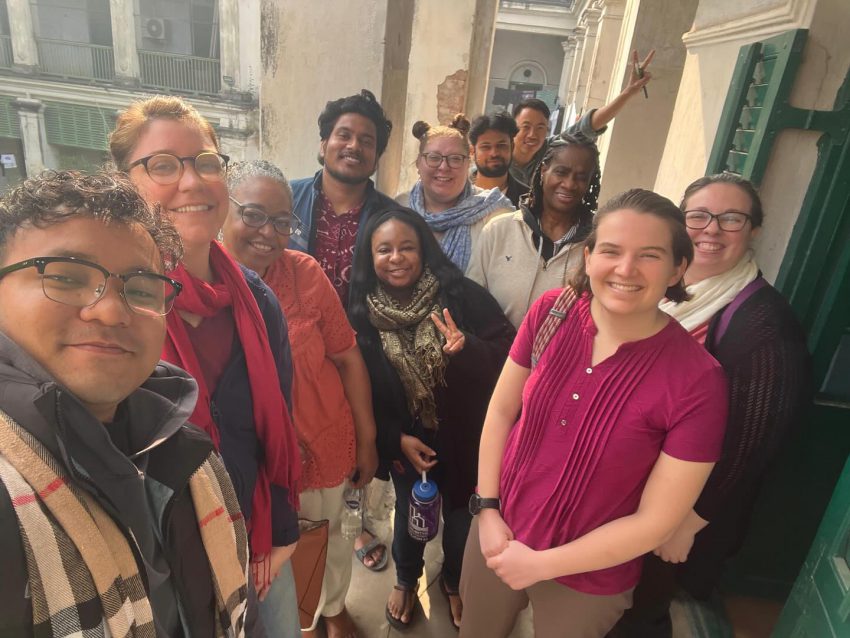Whenever I return home to India, I am always asked questions about the church in the United States— questions such as, “How many Christians are there in the city you live in?” and “How is church attendance in the U.S.?” In fact, I get similar questions from friends in the U.S. inquiring about Christians in my part of India. Christians from across the globe are indeed intrigued to find out the state of Christian faith and practices in other parts of the world. I hope this interest comes not only out of our curiosity but also out of our deep sense of connection with our brothers and sisters who are trying to live faithfully to God within their own contexts.
Praying for the Global Church
 When we start praying for the “global church,” we have to examine what and who it is we tend to pray for. My guess is that most of us are praying for those in the Southern Hemisphere—the Global South, especially those countries experiencing poverty and social and political unrest. Witness the fact that many world prayer books focus on stories or problems from countries in the Global South and not in the Western world. This lopsidedness gives the impression that only the church and people in Africa, Asia, and Latin America need our prayers.
When we start praying for the “global church,” we have to examine what and who it is we tend to pray for. My guess is that most of us are praying for those in the Southern Hemisphere—the Global South, especially those countries experiencing poverty and social and political unrest. Witness the fact that many world prayer books focus on stories or problems from countries in the Global South and not in the Western world. This lopsidedness gives the impression that only the church and people in Africa, Asia, and Latin America need our prayers.
While it is important that we pray for our brothers and sisters in these contexts, I believe it sets up an unhelpful divide. This tendency to focus on praying for Christians in the Global South stems from the traditional perception that Christianity is a Western religion and that it spread globally from the West. Yet the truth is that Christianity had sprung out of Asia and spread through Asia and Africa long before it went to Western Europe (e.g., Acts 8:26-40). So in today’s world, praying for the global church doesn’t necessarily mean only praying for the church in India or Sierra Leone—it can also mean praying for the church in the U.S. or Germany.
Praying for Believers In Any Context

The need for prayer for churches throughout the world is further accented by the rapid growth of the church in Latin America, Asia, and Africa. In all contexts—from north to south, east to west—faithful people are facing barriers, from poverty to societal apathy, from political persecution to political exploitation of their faith. No matter how privileged the church might be or appear to be in a given context, all Christian believers throughout the world need support in prayer by their brothers and sisters in Christ.
Furthermore, we pray for the global church because Scripture instructs us to do so (1 Tim 2:1). From a biblical perspective, we know that as Christians we are all connected as one in Jesus Christ. Paul in his letter to the Corinthian church clearly states that, since we are all parts of the body of Christ, we cannot neglect some parts of the body and think they are not important or that we don’t need them (1 Cor 12:12-31). For Paul, if one part of the body suffers, the entire body suffers. We need each other in order to grow and learn.
Praying Across Theological Differences
Praying for the global church can be difficult especially when we don’t agree with the particular beliefs of a specific church. According to the Center for the Study of Global Christianity, there are 45,000 Christian denominations in our world today (Todd M. Johnson and Cindy M. Wu, Our Global Families: Christians Embracing Common Identity in a Changing World, 2015, p. 56). Just imagine the number of theological differences and the varieties of ways we do church and mission. I personally find it tempting to start praying, “God, help these people see the light,” which really means, “God, help these people figure out that I am right, and they are wrong.” Yet the truth is that we should pray for God’s truth and love to shine forth in all parts of the world even when doing so makes us uncomfortable.
Praying for Specific Kindred in Christ

Praying for the global church can be overwhelming, too. There is so much going on in our world that we can get lost in who and what to pray for. But trying to be specific in our prayers can be very helpful on both ends. It can be done by finding a global church partner, an individual, or a neighborhood community from a different culture or country where a mutual relationship can be established and mutual learning, sharing, and praying can be experienced by both sides.
So, as we pray for the global church, let us remember that God is at work in different parts of the world, and together with our brothers and sisters around the world we are called to participate in God’s work by praying together for God’s reign in it. And let us begin by praying for the global church:
God of all nations, whose name and glory are manifested through all the diversity of cultures, races, and languages all around the world: We confess O God, that even though we know you have created everyone in your own image, oftentimes our words and actions deny this truth. Help us, O Lord, truly to see your face and hear your voice through the many faces and voices of our brothers and sisters around the world.
Lord, we pray for your church throughout the world, that amid our differences we may realize we are all parts of one body. Give us the strength to love, to listen, to hear, to share our resources, and to work alongside those who think and worship you differently, knowing that there is so much we can learn from one another and that together we can make your “Kin-dom” realized in this world. In Christ’s name, we pray. Amen.
Additional Resources
For further reading on cultural humility in Christian mission, see Freeing Congregational Mission, authored by WMI staff:
Book: Freeing Congregational Mission
To browse WMI’s current programmatic offerings, visit the WMI website:
Visit the WMI webpage
To stay up to date on future offerings from WMI, subscribe to the bi-monthly WMI e-newsletter:
Sign up for the WMI newsletter
To invite the author of this post or another PTS faculty or staff member to speak, teach, or preach for your community, visit the PTS Out and About webpage (below). Specializations include a broad range of topics related to Christian Leadership, Congregational Ministry, Church and Society, Christian History, Theology, and Biblical Studies:
Invite a PTS faculty or staff member to visit your community: PTS Out and About
 The Rev. Balajiedlang (Bala) Khyllep is acting director of Pittsburgh Theological Seminary’s World Mission Initiative. WMI nurtures partnerships with communities in a variety of global contexts, hosts a bi-annual conference, oversees certificate programs in Missional Leadership and in Migrant Ministries, and facilitates intercultural learning experiences, including the annual Valentour Research Fellowship and Intercultural Learning Trips, in which seminary students and others spend several days in a cultural context different from their own to grow in intercultural awareness, reflect with fresh perspective upon their own contexts, and learn from and with Christian communities around the world. Learn more about WMI’s work: https://www.pts.edu/WMI
The Rev. Balajiedlang (Bala) Khyllep is acting director of Pittsburgh Theological Seminary’s World Mission Initiative. WMI nurtures partnerships with communities in a variety of global contexts, hosts a bi-annual conference, oversees certificate programs in Missional Leadership and in Migrant Ministries, and facilitates intercultural learning experiences, including the annual Valentour Research Fellowship and Intercultural Learning Trips, in which seminary students and others spend several days in a cultural context different from their own to grow in intercultural awareness, reflect with fresh perspective upon their own contexts, and learn from and with Christian communities around the world. Learn more about WMI’s work: https://www.pts.edu/WMI

